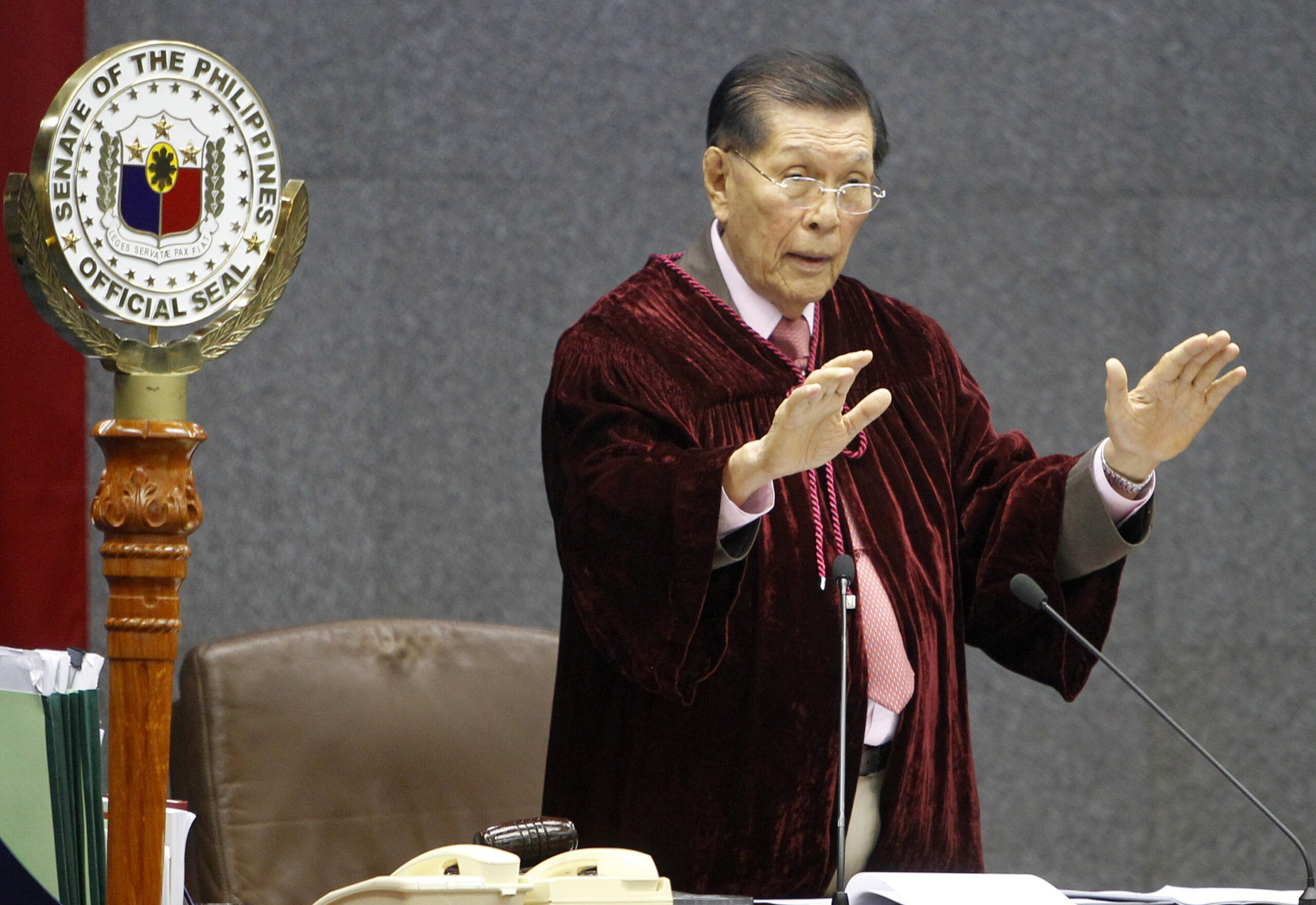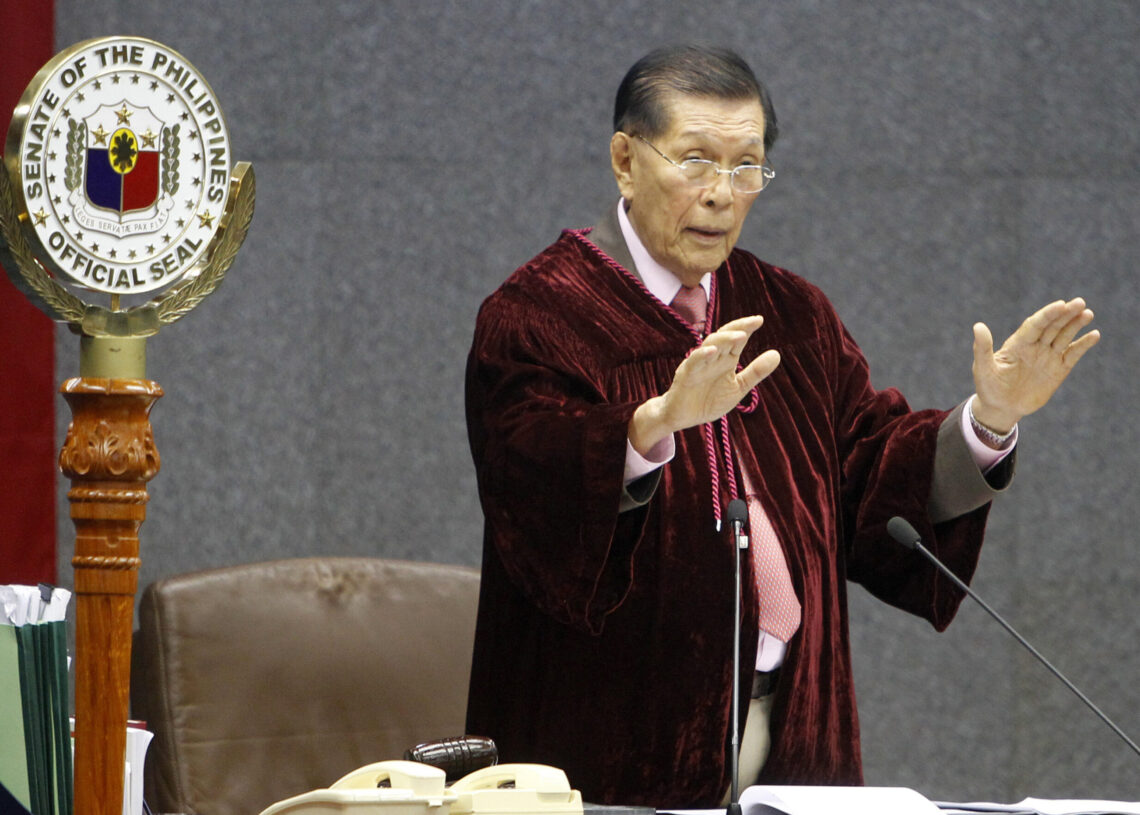
Juan Ponce Enrile, who administered martial law as Philippine defense minister under President Ferdinand E. Marcos, helped oust his autocratic mentor during the “people power” revolution of 1986 and was implicated in coup attempts against the country’s restored democracy, died Nov. 13. He was 101.
His death was announced by his daughter, Katrina Ponce Enrile, who said he died at home. Mr. Enrile had recently been hospitalized with pneumonia.
Juan Ponce Enrile, who administered martial law as Philippine defense minister under President Ferdinand E. Marcos, helped oust his autocratic mentor during the “people power” revolution of 1986 and was implicated in coup attempts against the country’s restored democracy, died Nov. 13. He was 101.
His death was announced by his daughter, Katrina Ponce Enrile, who said he died at home. Mr. Enrile had recently been hospitalized with pneumonia.
A quintessential survivor, Mr. Enrile staged remarkable comebacks in the fractious Philippine political scene and served as a senator into his 90s. He held the title of chief presidential legal counsel until his death and was among the world’s oldest people still working in government.
During his first stint in the Senate — starting in 1987, after he was kicked out of President Corazon Aquino’s cabinet for plotting a coup against her — he was lambasted by colleagues who recalled late-night arrests, assassinations, torture and forced exile during his tenure as defense minister under Marcos. But solid support from his home region helped keep him in office, and he was twice elected Senate president.
In 2022, the 98-year-old Mr. Enrile, a Harvard-educated lawyer, was sworn in as chief legal counsel to the newly elected president, Ferdinand Marcos Jr. With his full head of dyed jet-black hair, Mr. Enrile appeared younger than his years, but that did not stop social media commentators from joking about his age.
“Getting Juan Ponce Enrile as Presidential Legal Counsel is a stellar move,” one wrote on Twitter. “Who better than the man who drafted the Ten Commandments?”
The appointment disregarded Mr. Enrile’s role in deposing Marcos Jr.’s father. That act of rebellion ended 20 years of Marcos rule, during which Mr. Enrile became one of the country’s richest men, thanks largely to logging concessions and his partnership in a lucrative coconut monopoly.
Mr. Enrile, a defense minister with presidential ambitions, broke with the elder Marcos on Feb. 22, 1986, days after the long-entrenched autocrat declared himself the winner of a Feb. 7 election marred by rampant fraud.
According to his 2012 memoir, Mr. Enrile’s break, years in the making, was sparked by a succession struggle as the president’s health deteriorated. He feared that rivals could assassinate him if Marcos died in office. Mr. Enrile had also grown disenchanted with the regime’s ineffectiveness in dealing with a communist insurgency.
Mr. Enrile and Lt. Gen. Fidel V. Ramos, the armed forces vice chief of staff, came out in support of Aquino as the rightful president-elect. After the 1983 assassination of her husband, Benigno S. Aquino Jr., by Philippine soldiers upon his return from exile, she had become a revered figure seen by many as uniquely able to unite a fractious opposition.
Mr. Enrile, Ramos and troops loyal to them seized Camp Aguinaldo, site of the Defense Ministry and armed forces headquarters in the eastern part of the capital, Manila.
But the rebels were only a few hundred strong at the outset, and Mr. Enrile worried that they would be crushed if Marcos launched an attack on them. So he played for time. He and Ramos held a marathon news conference at Camp Aguinaldo to announce the mutiny, reasoning that Marcos would not attack a venue packed with Philippine and foreign journalists.
He also reached out to Cardinal Jaime Sin, the influential Catholic archbishop of Manila and longtime Marcos foe. Known as a moderate and an anti-communist, Sin had long pursued a policy of “critical collaboration” with Marcos, who had cracked down hard on the political opposition when he declared martial law in 1972 but gradually eased controls and lifted the declaration in 1981.
The cardinal now sensed an opportunity to rid the Philippines of a corrupt and unpopular regime that he once compared to “a plague of locusts.” He called on the faithful to take to the streets and form “human barricades” to protect the rebels from attack.
Hundreds of thousands of Filipinos heeded the call. Over the next few days, they clogged the main thoroughfare that borders the camp, repeatedly turning back loyalist troops and tanks sent by Marcos.
Facing the prospect of being dragged out of the Malacañang presidential palace by an angry mob, Marcos fled with his family to a U.S. air base north of Manila on Feb. 25 and was flown into exile in Hawaii.
“I was a very good student of Mr. Marcos,” Mr. Enrile told The Washington Post a week after the triumph of the popular revolt. Describing how he outwitted his political mentor of 21 years, he added, “He was dealing with me like a kid.”
Aquino took office as president and appointed Mr. Enrile defense minister again. The move effectively recognized Mr. Enrile’s role in deposing Marcos.
But the relationship quickly soured, in part because he yearned to run the country himself. During a June 1986 visit to Marcos’s home province, he was addressed as “Mr. President” by an effusive local official. “I am not the president yet,” Mr. Enrile replied.
Five months later, he was booted from Aquino’s cabinet after he and his military followers were implicated in a failed coup attempt.
In 1987, Mr. Enrile won a Senate seat. He also was detained in connection with another coup plot that August, but he was released days later for a purported lack of evidence. That putsch was guided by a former top Enrile aide, Col. Gregorio “Gringo” Honasan, and left more than 50 people dead and 200 wounded. Among the injured in an attack on the presidential palace was Aquino’s son, Benigno Aquino III, who would later become president.
Mr. Enrile was arrested again in February 1990 and charged with “rebellion with murder” in connection with a coup attempt two months earlier during which at least 119 people were killed and more than 500 were wounded in six days of fighting. But the Philippine Supreme Court dismissed the charges against the sitting senator and 22 other alleged participants.
Mr. Enrile ultimately served one term in the House of Representatives and four terms in the Senate following the ouster of Marcos. He was elected Senate president in 2008, a post he held until he stepped down in 2013 amid a scandal over the alleged misuse of Senate funds. He left the chamber altogether at the end of his term in 2016.
In 1998, he ran for president as an independent but received less than 1.3 percent of the vote, trailing far behind the winner, former actor and vice president Joseph Estrada.
Mr. Enrile was born Juanito Furagganan on Feb. 14, 1924, in a tiny coastal fishing village in Cagayan province in the far northern Philippines. He was the son of a widowed mother and a biological father who was married to another woman. His stepfather was a fisherman who never went to school.
Mr. Enrile grew up poor, working as a houseboy for relatives in return for schooling, room and board. He recalled being brutally attacked in high school by four boys from prominent families, then unjustly expelled without an investigation.
After the Japanese invasion of the Philippines during World War II, Mr. Enrile, still a teenager, joined the resistance. Late in the war, he wrote, he was captured and spent three months in detention in the town of Aparri, where he suffered beatings and torture, including what is now called waterboarding. He was able to escape after U.S. forces arrived to retake the islands.
Mr. Enrile did not meet his biological father, a prominent regional politician and lawyer named Alfonso Ponce Enrile, until he found him in Manila after the war. He was 21. The elder Enrile took him under his wing as he completed high school in the capital and helped him change his name to Juan Ponce Enrile.
Mr. Enrile graduated in 1953 from the University of the Philippines, and he received a master’s degree from Harvard Law School in 1955. A specialist in international tax law, he practiced in his father’s firm before teaming up with Ferdinand Marcos, then a senator, in 1964.
When Marcos was elected president in 1965, Mr. Enrile began a rise through government ranks. He served as secretary of justice for two years before Marcos put him in charge of the Department of National Defense.
In that post, Mr. Enrile administered martial law, which Marcos had declared so he could remain in power long past the two-term presidential limit. One rationale for the move was an alleged terrorist attack on Mr. Enrile’s Mercedes-Benz near Manila’s Wack Wack golf club. Years later, with the revolt against Marcos underway, Mr. Enrile acknowledged to reporters that the assassination attempt was staged.
In 1957, he married Cristina Castañer. They had two children: former congressman Juan Castañer Ponce Enrile Jr., known as Jack, and Katrina Ponce Enrile, who runs the family-owned Jaka Group company. Complete information on survivors was not immediately available.
At an event in Manila in 2012 to promote his self-titled memoir, Mr. Enrile displayed rare emotion as he spoke of the hardships of his youth, and he asked for “forgiveness from those who I may have hurt, for, to be sure, there were many.”
Then, taking a more self-righteous turn, he concluded: “I’ve been judged and condemned many times. But I fear only the ultimate judgment of God and of history.”
The post Juan Ponce Enrile, Philippine politician who helped oust Marcos, dies at 101
appeared first on Washington Post.




